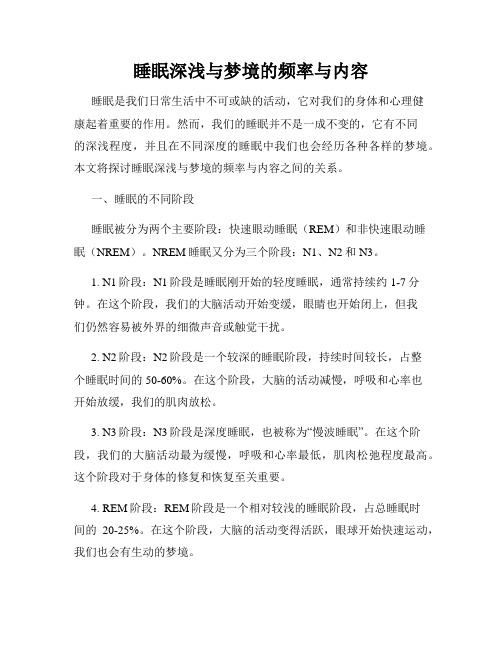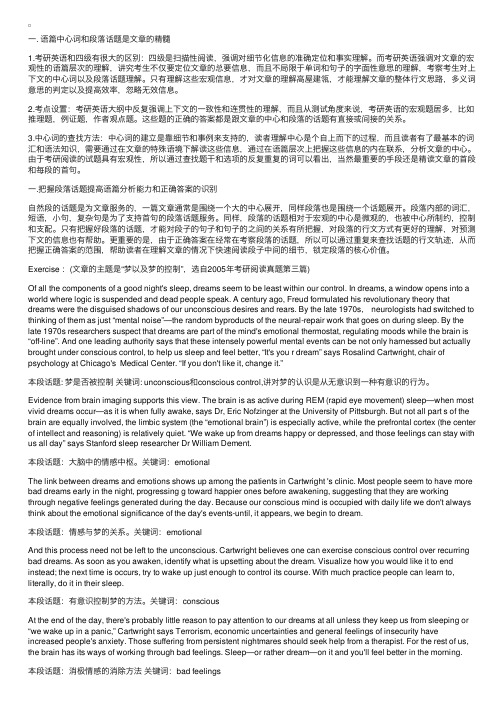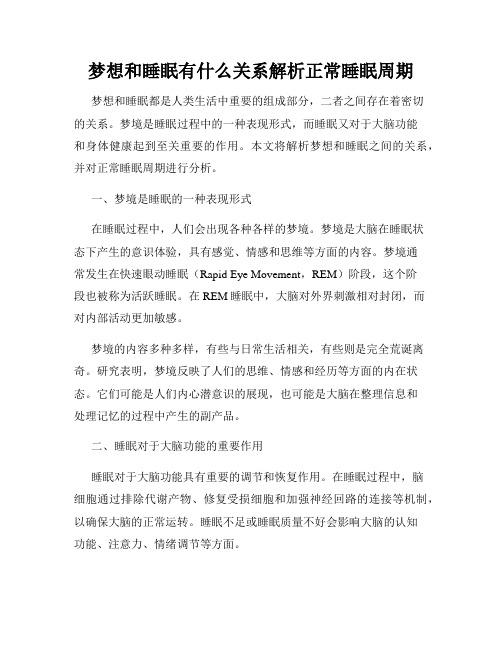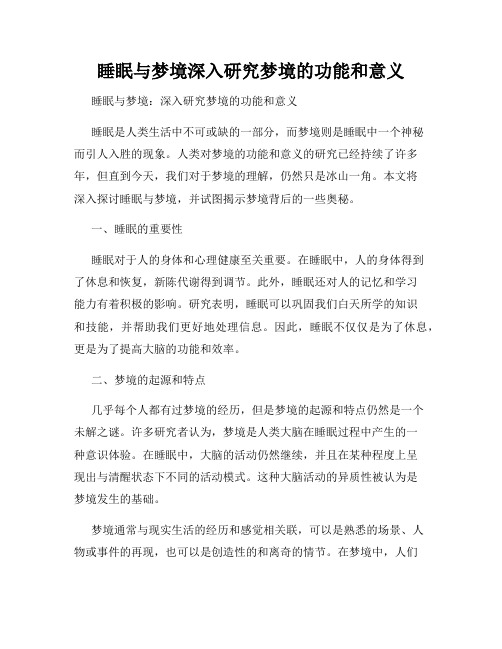sleep and dreams睡眠与梦
睡眠深浅与梦境的频率与内容

睡眠深浅与梦境的频率与内容睡眠是我们日常生活中不可或缺的活动,它对我们的身体和心理健康起着重要的作用。
然而,我们的睡眠并不是一成不变的,它有不同的深浅程度,并且在不同深度的睡眠中我们也会经历各种各样的梦境。
本文将探讨睡眠深浅与梦境的频率与内容之间的关系。
一、睡眠的不同阶段睡眠被分为两个主要阶段:快速眼动睡眠(REM)和非快速眼动睡眠(NREM)。
NREM睡眠又分为三个阶段:N1、N2和N3。
1. N1阶段:N1阶段是睡眠刚开始的轻度睡眠,通常持续约1-7分钟。
在这个阶段,我们的大脑活动开始变缓,眼睛也开始闭上,但我们仍然容易被外界的细微声音或触觉干扰。
2. N2阶段:N2阶段是一个较深的睡眠阶段,持续时间较长,占整个睡眠时间的50-60%。
在这个阶段,大脑的活动减慢,呼吸和心率也开始放缓,我们的肌肉放松。
3. N3阶段:N3阶段是深度睡眠,也被称为“慢波睡眠”。
在这个阶段,我们的大脑活动最为缓慢,呼吸和心率最低,肌肉松弛程度最高。
这个阶段对于身体的修复和恢复至关重要。
4. REM阶段:REM阶段是一个相对较浅的睡眠阶段,占总睡眠时间的20-25%。
在这个阶段,大脑的活动变得活跃,眼球开始快速运动,我们也会有生动的梦境。
二、睡眠深浅与梦境的频率睡眠深浅与我们经历梦境的频率有着密切的关系。
一般来说,我们在REM睡眠阶段经历的梦境最为生动、多样且频率较高,而在NREM 睡眠阶段,我们所产生的梦境则较为稀少。
REM睡眠阶段是我们梦境最为活跃的时期,因为大脑的活动变得非常活跃。
在这个阶段,我们很容易经历各种各样的梦境,无论是愉快的、恐怖的还是奇幻的。
一般来说,每晚我们会经历多个REM周期,每个周期持续时间约为90-120分钟,且每个周期的REM睡眠时间会逐渐延长。
相比之下,NREM睡眠阶段我们梦境的频率要低得多。
这是因为在NREM睡眠阶段,我们的大脑活动相对较慢,梦境的产生并不常见。
虽然在NREM睡眠阶段我们依然可能有梦境,但它们通常比REM睡眠阶段的梦境要更简单、更含糊。
意识睡眠催眠与梦

催眠也可以用于消除噩梦,通过重新编程可以改变梦境内容,从而消除噩梦 带来的不良影响。
04
临床应用
催眠疗法在睡眠障碍中的应用
1 2
失眠的催眠疗法
通过催眠暗示改善患者睡眠质量,减少失眠的 发生。
嗜睡症的催眠疗法
通过增强意识状态和心理动力来改善嗜睡症状 。
睡眠呼吸暂停的催眠疗法
3
通过改变睡眠结构和呼吸模式来减轻睡眠呼吸 暂停症状。
THANKS
感谢观看
02
睡眠与梦
探究睡眠与梦的生理机制,以及梦对人类心理健康的影响。
03
催眠与心理调节
研究催眠在心理调节中的作用,为心理治疗提供理论支持与实践方法
。
未来研究方向与挑战
1 2
基础研究
继续深入研究意识、睡眠、催眠与梦的神经生 理机制,提高研究方法的科学性与可靠性。
应用研究
将研究成果应用于心理治疗、教育、医疗等领 域,提高人类生活质量。
睡眠周期
02
睡眠周期包括快速眼动期(REM)和非快速眼动期(NREM
),两者交替出现。
睡眠深度
03
睡眠深度分为浅睡、中睡和深睡,不同深度睡眠具有不同的生
理功能。
梦的心理学解析
梦的心理学理论
弗洛伊德认为梦是潜意识欲望的表达,而荣格认为梦是个人无意识的表现。
梦与情绪
梦境中常常出现情绪体验,如恐惧、焦虑、愤怒等,这些情绪与梦境内容相互交织。
意识与认知
催眠可以影响个体的认知过程,使个体对某些 事物的认知产生偏差,例如催眠后暗示效应等 。
意识与行为
催眠可以影响个体的行为表现,使个体在催眠 状态下表现出与平时不同的行为特征,例如在 催眠状态下进行手术等。
大学英语四级模拟试题及答题详解

大学英语四级模拟试题及答题详解Part I Reading Comprehension (Skimming and Scanning) (15 minutes)Directions: In this part, you will have 15 minutes to go over the passage quickly and answer the questions on Answer Sheet 1.For questions 1 - 7, markY (for YES) if the statement agrees with the information given in the passage;N (for NO) if the statement contradicts the information given in the passage;NG (for NOT GIVEN)if the information is not given in the passage.For questions 8 - 10, complete the sentences with the information given in the passage.SleepSleep is one of those funny things about being a human being --- you just have to do it. Have you ever wondered why? And what about the crazy dreams, like the one where a bad person is chasing you and you can’t run or yell. Does that make any sense?Characteristics of SleepWhen we see someone sleeping, we recognize the following characteristics:If possible, the person will lie down to go to sleep.The person’s eyes are closed.The person doesn’t hear anything unless it is a loud noise.The person breathes in a slow, rhythmic pattern.The person’s muscles are completely relaxed. If sitting up, the person may fall out of his or her chair as sleep deepens.During sleep, the person occasionally rolls over or rearranges his or her body. This happens approximately once or twice an hour. This may be the body’s way of making sure that no part of the body or skin has its circulation cut off for too long a period of time.In addition to these outward signs, the heart slows down and the brain does some prettyIn other words, a sleeping person is unconscious to most things happening in the environment. The biggest difference between someone who is asleep and someone who has fainted or gone into a coma is the fact that a sleeping person can be aroused if the stimulus presented by is strong enough. If you shake the person, yell loudly or flash a bright light, a sleeping person will wake up.Who Sleeps?Reptiles(爬行动物), birds and mammals all sleep. That is, they become unconscious to their surroundings for periods of time. Some fish and amphibians (两栖动物)(两栖动物) reduce their awareness but do not ever become unconscious like the higher vertebrates(脊椎动物) do. Insects do not appear to sleep, although they may become inactive in daylight or darkness.By studying brainwaves, it is known that reptiles do not dream. Birds dream a little. Mammals all dream during sleep.Different animals sleep in different ways. Some animals, like humans, prefer to sleep in one long session. Other animals like to sleep in many short bursts. Some sleep at night, while others sleep during the day.Sleep and the BrainIf you attach an electroencephalograph to a person’s head, you can record the person’s brainwave activity. An awake and relaxed person generates alpha waves, which are consistent oscillations at about 10 cycles per second. An alert person generates beta waves, which are about twice as fast.During sleep, two slower patterns called theta waves and delta waves take over. Theta waves have oscillations in the range of 3.5 to 7 cycles per second, and delta waves have oscillations of less than 3.5 cycles per second. As a person falls asleep and sleep deepens, the brainwave patterns slow down. A person deep in delta wave sleep is hardest to wake up.REM SleepAt several points during the night, something unexpected happens -- rapid eye movement (REM) sleep occurs. Most people experience three to five intervals of REM sleep per night, and brainwaves during this period speed up to awake levels. If you ever watch a person or a dog experiencing REM sleep, you will see their eyes flickering back and forth rapidly. In many dogs and some people, arms, legs and facial muscles will twitch during REM sleep. Periods of sleep other than REM sleep are known as NREM (non-REM) sleep.REM sleep is when you dream. If you wake up a person during REM sleep, the person can vividly recall dreams. If you wake up a person during NREM sleep, generally the person will notYou must have both REM and NREM sleep to get a good night ’s sleep. A normal person will spend about 25 percent of the night in REM sleep, and the rest in NREM. A REM session a dream -- lasts five to 30 minutes.When You Miss Some Zzzzs …One way to understand why we sleep is to look at what happens when we don ’t get enough: As you know if you have ever pulled an all-nighter, missing one night of sleep is not fatal. A person will generally be irritable during the next day and will either slow down (become tired easily ) or will be totally wired because of adrenalin (肾上腺素)。
意识、睡眠、催眠与梦

5 .
3.意识是一种心理状态。 它可以分为不同的层次或水平,如从无意识到意
识到注意,是一个连续体。 它还存在一般性变 化,如觉醒、惊奇、愤怒、警觉等。
4.意识是一种高级的心理机能。 意识对个体的身心系统起统合、管理和调控的作
用。它不只是对信息的被动觉察和感知,它具 有能动性和调节作用。
睡眠与梦
.
一、意识
(一)意识的定义: 意识是心理发展的高级阶段,是人独有
的最完善的反映形式,是人对客观现实 自觉能动的反映. 意识是一个古老而又难解的谜。迄今为 止,对于意识人们还没有找到一个令人 满意的定义。
.
就心理状态而言,“意识”意味着清醒、警觉、注 意集中等。
就心理内容而言,“意识”包括可用语言报告出的 一些东西,如对幸福的体验、对周围环境的知觉、 对往事的回忆等。
到了某种“现象”或“事物”,
例如:外语老师刚修整的新发型; 你的好朋 友对你的文章的评价;等等,你觉察到这些 外部事物的存在,说明你意识到了它们。
人也能觉察到某些内部状态,如疲劳、眩晕 、等等。
.
(2.) 意识是一种记忆 詹姆斯曾引用法国人查尔斯·理迟特
1884年的一段话: “片刻的苦痛微不 足道,对我而言,我宁愿忍受疼痛,哪 怕它是剧烈的,只要它持续的时间很短 ,而且,在疼痛过去之后,永远不再出 现并永远从记忆中消失。”
的变化,如呼吸、肌肉强度、心率、血 压等,以这些指标的变化作为睡眠研究 的主要信息源。
11 .
睡眼中各阶段的脑电波形态图
.
波和波 当大脑处于清醒、安静和休息状态时
,出现 波。 波波幅稍大,频 率较低,每秒8-13个周期 当大脑处于清醒和警觉状态时,出现 波。 波波幅较低,频率较 高,每秒14-30 个周期。
名师肖克:英语阅读A段答题技巧(1)

本段话题: 梦是否被控制 关键词: unconscious和conscious control,讲对梦的认识是从无意识到一种有意识的行为。
Evidence from brain imaging supports this view. The brain is as active during REM (rapid eye movement) sleep—when most vivid dreams occur—as it is when fully awake, says Dr, Eric Nofzinger at the University of Pittsburgh. But not all part s of the brain are equally involved, the limbic system (the “emotional brain”) is especially active, while the prefrontal cortex (the center of intellect and reasoning) is relatively quiet. “We wake up from dreams happy or depressed, and those feelings can stay with us all day” says Stanford sleep researcher Dr William Dement.
梦想和睡眠有什么关系解析正常睡眠周期

梦想和睡眠有什么关系解析正常睡眠周期梦想和睡眠都是人类生活中重要的组成部分,二者之间存在着密切的关系。
梦境是睡眠过程中的一种表现形式,而睡眠又对于大脑功能和身体健康起到至关重要的作用。
本文将解析梦想和睡眠之间的关系,并对正常睡眠周期进行分析。
一、梦境是睡眠的一种表现形式在睡眠过程中,人们会出现各种各样的梦境。
梦境是大脑在睡眠状态下产生的意识体验,具有感觉、情感和思维等方面的内容。
梦境通常发生在快速眼动睡眠(Rapid Eye Movement,REM)阶段,这个阶段也被称为活跃睡眠。
在REM睡眠中,大脑对外界刺激相对封闭,而对内部活动更加敏感。
梦境的内容多种多样,有些与日常生活相关,有些则是完全荒诞离奇。
研究表明,梦境反映了人们的思维、情感和经历等方面的内在状态。
它们可能是人们内心潜意识的展现,也可能是大脑在整理信息和处理记忆的过程中产生的副产品。
二、睡眠对于大脑功能的重要作用睡眠对于大脑功能具有重要的调节和恢复作用。
在睡眠过程中,脑细胞通过排除代谢产物、修复受损细胞和加强神经回路的连接等机制,以确保大脑的正常运转。
睡眠不足或睡眠质量不好会影响大脑的认知功能、注意力、情绪调节等方面。
此外,睡眠对于记忆和学习的重要性也不可忽视。
睡眠过程中,大脑会对前一段时间的学习内容进行整理和巩固,促进记忆的形成和强化。
有研究表明,睡眠对于记忆的影响甚至超过学习的时间本身。
因此,良好的睡眠质量有助于提高学习和记忆的效果。
三、解析正常睡眠周期正常的睡眠周期由两个交替出现的阶段组成:快速眼动睡眠(REM)和非快速眼动睡眠(Non-Rapid Eye Movement,NREM)。
一个完整的睡眠周期通常持续约90分钟,人们在夜间会经历多个睡眠周期。
在每个睡眠周期中,先是NREM阶段,分为N1、N2和N3三个阶段,这三个阶段的睡眠深度逐渐加深。
N1阶段是入睡的初期,人们处于浅睡眠状态,易被外界刺激唤醒。
N2阶段是睡眠的主要部分,此时大脑活动逐渐减慢,身体各项功能进入休息状态。
心理学硕士论文中的睡眠与梦境研究

心理学硕士论文中的睡眠与梦境研究睡眠和梦境是人类每天必不可少的生理和心理活动,它们对人类的身心健康产生着深远的影响。
心理学硕士论文中的睡眠与梦境研究是一个引人入胜且充满挑战的领域。
本文将探讨睡眠与梦境的定义、分类以及在心理学研究中的重要性和应用。
一、睡眠的定义和分类睡眠是一种周期性的生理状态,通过大脑的神经活动和意识改变特征来表现。
根据睡眠的特点和大脑活动的变化,睡眠可以分为REM(快速眼动)睡眠和非REM睡眠两个主要阶段。
REM睡眠是睡眠周期中占比较小并伴随快速眼动的阶段,而非REM睡眠则有四个阶段,从浅度到深度逐渐增加。
二、梦境的定义和类型梦境是在睡眠状态中产生的一系列视觉、听觉、情感和思维体验。
梦境的内容丰富多样,可以是逼真的、离奇的、恐怖的或者愉快的。
根据不同的理论和研究,梦境可以分为多种类型,包括符号梦、噩梦、反复梦、预知梦等。
三、睡眠与梦境在心理学研究中的重要性1. 记忆与学习:睡眠被认为在记忆和学习过程中发挥着重要作用。
研究表明,睡眠可以巩固和整理当天获取的信息,帮助加强记忆和提高学习效果。
2. 情绪调节:睡眠和梦境与情绪调节密切相关。
不良的睡眠质量可能导致情绪不稳定、焦虑和抑郁等心理问题。
因此,研究睡眠和梦境对于理解和处理情绪障碍具有重要意义。
3. 心理健康:睡眠对于维持良好的心理健康至关重要。
睡眠不足和睡眠障碍与心理疾病如抑郁症、焦虑症以及认知功能下降等问题密切相关。
研究睡眠与梦境有助于改善心理健康问题并提供更有效的干预措施。
四、心理学硕士论文中的睡眠与梦境研究方法1. 睡眠监测:通过使用脑电图、眼动仪和生理传感器等设备对睡眠进行监测和记录,以获得关于睡眠质量、睡眠阶段和睡眠周期等方面的数据。
2. 梦境调查:使用问卷或面谈等方式收集人们的梦境体验和回忆,并对梦境内容和情感进行分析和解释。
3. 心理实验:通过在控制实验条件下进行实验,研究者可以探索睡眠和梦境对认知、感知和情绪等方面的影响。
睡眠与梦境深入研究梦境的功能和意义

睡眠与梦境深入研究梦境的功能和意义睡眠与梦境:深入研究梦境的功能和意义睡眠是人类生活中不可或缺的一部分,而梦境则是睡眠中一个神秘而引人入胜的现象。
人类对梦境的功能和意义的研究已经持续了许多年,但直到今天,我们对于梦境的理解,仍然只是冰山一角。
本文将深入探讨睡眠与梦境,并试图揭示梦境背后的一些奥秘。
一、睡眠的重要性睡眠对于人的身体和心理健康至关重要。
在睡眠中,人的身体得到了休息和恢复,新陈代谢得到调节。
此外,睡眠还对人的记忆和学习能力有着积极的影响。
研究表明,睡眠可以巩固我们白天所学的知识和技能,并帮助我们更好地处理信息。
因此,睡眠不仅仅是为了休息,更是为了提高大脑的功能和效率。
二、梦境的起源和特点几乎每个人都有过梦境的经历,但是梦境的起源和特点仍然是一个未解之谜。
许多研究者认为,梦境是人类大脑在睡眠过程中产生的一种意识体验。
在睡眠中,大脑的活动仍然继续,并且在某种程度上呈现出与清醒状态下不同的活动模式。
这种大脑活动的异质性被认为是梦境发生的基础。
梦境通常与现实生活的经历和感觉相关联,可以是熟悉的场景、人物或事件的再现,也可以是创造性的和离奇的情节。
在梦境中,人们经历着各种各样的情绪和感觉,有时甚至比清醒状态下更为强烈。
梦境的内容和形式是非常个体化的,每个人都有着独一无二的梦境体验。
三、梦境的功能和意义1. 处理和整合信息梦境被认为是大脑处理和整合信息的一种方式。
在睡眠过程中,大脑会对白天的经历进行筛选和整理,帮助我们将重要的记忆存储下来,同时也有助于遗忘无关紧要的信息。
通过梦境,我们可以与自己的情绪、经历和思想进行沟通,加深对自己内心世界的认识。
2. 探索潜意识梦境可以提供对潜意识的一窥。
梦境中常常出现的符号、象征和隐喻意味着我们潜意识中的某些渴望、恐惧或愿望。
通过解析梦境,我们可以更好地了解自己的内心需求和挑战,从而更好地应对生活中的问题和困惑。
3. 创造和灵感的源泉梦境常常被艺术家和作家作为创作的灵感之源。
睡眠和梦读书摘录学习笔记

睡眠和梦如果你曾经仔细观察我们身边的每个人,他们几乎都处在不同的意识状态下,不论是主动还是被动,大多人都在试图改变自身的意识状态。
接下来,我们从睡眠和梦开始探索,究竟他们是怎么改变的。
3.1 睡眠需要我们的一生中,大约有25年的时间,都在睡眠中度过。
我们觉得自己对睡眠了如指掌,其实我们知道的很多关于睡眠的“常识”并不准确。
比如通常情况下,我们都认为只要我们睡着,就完全没有反应,可事实并非如此。
一个熟睡的母亲或许听不见其他的声音,可是一旦她的孩子发出非常轻的声音,她就会立刻醒来,尽管在这之前,空调的声音比孩子的声音还要大。
还有一些人,他们虽然熟睡了,可是只要有人叫他们的名字,他们也更加容易醒过来。
有实验证明,有些睡眠者甚至可以在睡眠的过程中完成一些简单的任务,从而躲避掉一些危险。
那我们可以多长时间不睡觉呢?对一般人来说,持续4天或是以上缺乏睡眠,会让我们感到极大的痛苦,而大多数人只要睡一晚上,就可以恢复精神状态。
如果我们的睡眠长期缺失,我们很容易会表现出言语含糊,注意力不集中,记忆力下降等症状。
具体表现为,对平时熟悉的东西,也很难叫出名字。
严重的睡眠缺失,甚至可能导致暂时性的睡眠剥夺精神病。
这种疾病会让我们丧失掉与现实世界的联系能力,出现一些精神错乱,或者是妄想幻觉的症状。
对于我们而言,睡眠从来都是必需品,而并非奢侈品。
3.2 失眠在美国,有6000万人长期受到失眠的困扰。
失眠的人,要么是入睡困难,要么是夜间长醒,要么是早醒,或者是这几种情况兼而有之。
长期失眠,会严重影响到我们的工作、健康以及人际关系。
引起失眠的原因有很多,比如我们常常会因为忧虑、压力或者是兴奋而睡不着。
压力会让我们有意识地的早醒,从而陷入更加挫败的自我循环。
兴奋,是失眠的另外一个重要原因。
兴奋这种过度的精神活动,会让我们的大脑一直处于兴奋状态。
失眠,导致的挫败和愤怒,会引发我们更多的忧虑,使我们的睡眠进一步延迟,从而导致更大的挫败感。
中级口译教程(word版)版第一部分

上海紧缺人才培训工程教学系列丛书英语中级口译资格证书考试总主编戴炜栋中级口译教程InterpretationThird Edition梅德明编著目录第一部分口译概论Part One An Overview of Interpretation一、口译历史The Development of Interpretation 2二、口译定义The Definition of Interpretation 5三、口译特点The Characteristics of Interpretation 7四、口译标准The Criteria of Interpretation 9五、口译过程The Process of Interpretation 11六、口译类型The Categorical Classification of Interpretation 15七、口译模式 A Tripartite Model of Interpretation 17八、译员素质Interpreter Qualification Requirements 19九、口译培训Interpreter Training 21十、口译研究Research in Interpretation and Interpreting 22第二部分培训教程Part Two A Training Course第一单元口译技巧_______________________________________ 30Unit One Introducing Skills in Interpreting1-1称谓口译 Interpreting Titles 301-2谚语口译 Interpreting Proverbs 331-3引语口译 Interpreting Quotations 371-4数字口译 Interpreting Numbers 401-5口译笔记 Note-Taking in Interpreting 46第二单元接待口译_______________________________________---------- —------------------------------------------------------- — ------------------------ 54Unit Two Interpreting for Reception Service2-1机场迎宾 Greetings at the Airport 542-2宾馆入住 Hotel Accommodation 562-3宴会招待 Banquet Service 582-4参观访问 Getting Around 61句子精练 Sentences in Focus 64参考译文 Reference Version 66第三单元会谈口译_________________________------------------------------------------------------------------- — ---------------------------'75Unit Three Interpreting Conversations3-1欢迎光临 Welcome 753-2投资意向 A Wish to Invest 773-3合资企业 Establishing a Joint Venture 803-4文化差异 Cultural Differences 83句子精练 Sentences in Focus 88参考译文 Reference Version 90第四单元访谈口译____________________________________Unit Four Interpreting Interviews 1004-1行在美国Travel in America 1004-2艾滋哀之The AIDS Epidemic 1044-3经营之道Business Management 1074-4音乐天才 A Gifted Musician 111句子精练 Sentences in Focus参考译文 Reference Version第五单元礼仪性口译(英译汉) 127Unit Five Interpreting Ceremonial SpeechesEnglish-Chinese Interpretation5 -1故地重游 Revisiting the Old Haunt 1275-2愉悦之旅 A Pleasant Trip 1295 -3共创未来 Our Future 1325-4新的长征 A New Long March 135句子精练 Sentences in Focus 139参考译文 Reference Version 142第六单元礼仪性口译(汉译英) 150Unit Six Interpreting Ceremonial Speeches Chinese-English Interpretation6- 1新春联欢 Celebrating the Spring Festival 1506-2圣诞晚会 At the Christmas Party 1516-3开幕祝词 An Opening Speech 1536-4展望未来 Looking Ahead 156句子精练 Sentences in Focus 159参考译文 Reference Version 161第七单元介绍性口译(英译汉)171Unit Seven Interpreting Informative Speeches English-Chinese Interpretation7-1绿色城市 A Green City 1717-2浪漫香槟 The Romantic Champagne 1747-3游客之居 A Place to Stay 1777-4教堂之游 A Tour around the Cathedral 179句子精练 Sentences in Focus 182参考译文 Reference Version 185第八单元介绍性口译(汉译英) ___________ 192Unit Eight Interpreting Informative Speeches Chinese-English Interpretation8 -1丝绸之路 The Silk Road 1928-2传统节日 Traditional Holidays 1948-3教育之本 The Purpose of Education ‘1978-4出版王者 The Super-Publisher 200句子精练 Sentences in Focus 203参考译文 Reference Version 205第九单元说服性口译(英译汉) __________________ 218Unit Nine Interpreting Persuasive SpeechesEnglish-Chinese Interpretation9-1强市之路 The Road to a Prosperous City 2189-2广而误之 The Effects of Misleading Advertising 2249-3大学精神 The University Spirit 2279-4继往开来 The New Beginning of an Old Story 231句子精练 Sentences in Focus 235参考译文 Reference Version 238第十单元说服性口译(汉译英) ____________________ 247Unit T en Interpreting Persuasive SpeechesChinese-English Interpretation10 -1 第二文化 Acquiring a Sepond Culture 247 10-2 环境保护 Environmental Protection 249 10-3 迎接挑战 Meeting the Challenge 252 10-4 习武健身 Practising Martial Art for Your Health 256句子精练 Sentences in Focus 259参考译文 Reference Version 261第十一单元学术性口译(英译汉)275Unit Eleven Interpreting Academic SpeechesEnglish-Chinese Interpretation11-1 语言系统 The Linguistic System 275 11-2 人机之争 Two Kinds of Brain . 277 11 - 3 生物革命 The Biological Revolution 280 11-4 股票市场 The Stock Market 285句子精练 Sentences in Focus '' 288参考译文 Reference Version 291第十二单元学术性口译(汉译英) 299_Unit Twelve Interpreting Academic SpeechesChinese-English Interpretation12-1 语用能力 Communicative Competence 299 12-2 文化冲突〇n Cultural Clashes 301 12-3 书法艺术 The Art of Calligraphy 303 12-4 社区服务 Community Service 305句子精练 Sentences in Focus 308参考译文 Reference Version 310第十三单元商务性口译(英译汉)Unit Thirteen Interpreting Business Speeches321English-Chinese Interpretation13-1企业文化 Entrepreneurial Culture 321 13-2认识债券 Getting to Know Bonds 325 13-3硅谷之贵 The Unique Silicon Valley 329 13-4专利法规〇n Patent Laws 333句子精练 Sentences in Focus 336参考译文 Reference Version 338第十四单元商务性口译(汉译英)_________________ 347 Unit Fourteen Interpreting Business SpeechesChinese-English Interpretation14-1双边经贸 Bilateral Economy and Trade 34714-2亚洲合作 Asian Cooperation 35014-3夕卜资企业 Foreign-Capital Enterprises 35214-4经济关系 Economic Links 354句子精练 Sentences in Focus 358参考译文 Reference Version 360第十五单元科普性口译(英译汉) 373Unit Fifteen Interpreting Popular Science Speeches English-Chinese Interpretation15-1睡眠与梦 Sleep and Dream 37315-2音响今昔 The Sound Reproduction Industry 37515-3遗传信息 Genetic Information 37815-4左脑之优 Left Hemispheric Dominance 380句子精练 Sentences in Focus 384参考译文 Reference Version第十六单元科普性口译(汉译英) __________________ ____Unit Sixteen Interpreting Popular Science SpeechesChinese-English Interpretation16-1汉语概要 The ABC of Chinese 39416-2进化本质 The Nature of Biological Evolution 39616-3蚊虫之祸 The Power of the Petty Mosquito 39916-4用筷技艺 The Magic Chopsticks 401句子精练 Sentences in Focus 404参考译文 Reference Version 406第三部分口译测试I Part Three Interpretation Test in Brief口译测试概要与实践________________________________Interpretation T est : Essentials and Practice英语中级口译考试的要求、形式及题型Intermediate Interpretation T est::Requirement, Structure and Form 420英语中级口译模拟测试Model T ests for Intermediate Interpretation T est 423英语中级口译模拟测试参考答案Reference Version for Intermediate Model T ests 458后记一.口译历史The Development of Interpretation一种语言文字所表达的意义经由另一种语言文字转达出来叫做翻译。
托福听力TPO1原文 Conversation 1

托福听力TPO1原文Conversation 1下面就让小编来为大家介绍一下托福听力TPO1原文中Conversation 1的文本内容吧,大家要好好把握,这些都是非常有价值的材料,希望能够给准备托福听力的同学带来帮助。
TPO 1 Conversation 1NarratorListen to part of a conversation between a student and a librarian.StudentHi, um…, I really hope you can help me.LibrarianThat’s why I’m here. What can I do for you?StudentI’m supposed to do a literature review for my psychology course, but … having a hard time finding articles. I don’t even know where to start looking.LibrarianYou said this is for your psychology course, right? So your focus is on …StudentDream Interpretation.LibrarianWell, you have a focus, so that’s already a good start. Hmmm… well, there’re a few things… oh wait… have you checked to see if your professor put any material for you to look at on reserve?StudentAha, that’s one thing I did know to do. I just copied an article, but I still need three more on my topic from three different journals.LibrarianLet’s get you going on looking for those then. We have printed versions of twenty or so psychology journals in the Reference Section. These are ones published within the last year. Now that I think about it… there’s a journal named Sleep and Dreams.StudentOh, yeah, the article I just copied is from that journal, so I’ve got to look in other sources.LibrarianOk, actually, most of our materials are available electronically now. You can access psychology databases or electronic journals and articles through the library’s computers, and if you want to search by title with the word ‘dream’for example, just type it in and all the articles with ‘dream’in the title will come up on the screen.StudentCool, that’s great! Too bad I cannot do this from home.LibrarianBut you can. All of the library’s databases and electronic sources can be accessed through any computer connected to the university network.StudentReally?! I can’t believe I didn’t know that. It still sounds like it’s going to take a while though, you know, going through all of that information, all of those sources.LibrarianMaybe, but you already narrowed your search down to articles on Dream Interpretation, so it shouldn’t be too bad. And you probably notice that there’s an abstract or summary at the top of the first page of the article you copied. When you go into the databases and electronic sources, you have the option to display the abstracts on the computer screen, skimming those to decide whether or not you want to read the whole article should cut down some time.StudentRight, abstracts! They’ll definitely make the project more doable.I guess I should try out the electronic search while I’m still here then, you know, just in case.LibrarianSure, er… that computer’s free over there, and I’ll be here till five this afternoon.StudentThanks, I feel a lot better about this assignment now.翻译独白:听一段学生和图书管理员的对话。
深度睡眠与梦境的关系

深度睡眠与梦境的关系睡眠是人体必不可少的生理需求之一,它对我们的身心健康起着重要的作用。
在睡眠过程中,深度睡眠和梦境是两个关键的阶段。
深度睡眠是指进入睡眠状态后的一段时间,此时人体处于最深沉的休息状态,而梦境则是在睡眠中出现的一系列视觉和感觉体验。
本文将探讨深度睡眠与梦境之间的关系,以及它们对我们健康的影响。
深度睡眠是身体修复与恢复的重要阶段。
在深度睡眠时,人体的呼吸、心跳和肌肉活动变得更加缓慢,大脑的电活动也显著减少。
这个阶段是身体进行修复和维护的关键时间,有助于肌肉的恢复和生长,促进免疫系统的功能,以及调节内分泌系统。
此外,深度睡眠还有助于巩固记忆和学习,提高注意力和专注力。
梦境是睡眠中的一种特殊体验。
它是在快速眼动睡眠(REM)阶段发生的,此时大脑活动变得活跃,眼球快速运动。
梦境通常与我们的日常经历、情感和想象力相关,可以是逼真的场景、情节或者抽象的形象。
梦境不仅仅是一种娱乐和体验,它还与我们的心理健康和记忆功能密切相关。
深度睡眠和梦境之间存在着复杂的相互作用关系。
研究表明,深度睡眠的质量和时间长度与梦境的出现有一定的关联。
较长的深度睡眠时间可以增加梦境的发生频率和持续时间。
同时,深度睡眠的质量也影响梦境的内容和情感色彩。
如果我们在深度睡眠阶段被打扰或者睡眠质量不佳,可能会导致梦境的质量下降,出现噩梦或者无法回忆梦境内容的情况。
深度睡眠和梦境对我们的健康有着重要的影响。
充足的深度睡眠可以提高我们的免疫力,减少慢性疾病的风险,并促进身体的修复和恢复。
而梦境则与我们的心理健康和创造力密切相关。
梦境可以帮助我们处理情绪和压力,提供创意和灵感,促进个人成长和发展。
因此,保持良好的睡眠质量和充足的深度睡眠时间,有助于提高我们的整体健康水平。
为了促进深度睡眠和梦境的出现,我们可以采取一些养生的方法。
首先,建立规律的睡眠时间表,每天保持相同的入睡和起床时间,有助于调节我们的生物钟。
其次,创造一个安静、舒适和黑暗的睡眠环境,避免噪音、光线和干扰。
第二章睡眠与梦

梦游时患者表情呆板,对他人的刺激基本上不作反应,也很难被强行唤醒。患者虽意识不清,但动作似乎有目的性,似乎在从事一项很有意义的工作。发作后多能自动回到床上继续睡觉。梦游通常出现在睡眠的前1/3段的深睡期,次晨醒来,对晚间发生的事茫然无知,完全遗忘。该病以6~12岁的男孩多见。
②梦还有助于调节人的心理平衡。
梦境从情绪体验上看,可分为愉快与不愉快的:
愉快的梦境能使人得到愿望的“补偿”,即不能实现的愿望往往在梦境中可以得到满足;
不愉快的梦境总的说来是消极的,但也不能一概而论,其中,有些梦境如与人争吵、打斗等往往也可以起到心理“宣泄”的作用,也可以作为一种补偿,尽管这是消极的补偿。
梦游者是清醒的还是睡着的?
⑴专家们认为他们是处于半睡半醒的状态。铁普里特兹博士曾花了10年对这个问题进行研究,他说:“梦游者的运动器官是醒着的,而感觉器官却睡着了,起码是部分睡着了,换句话说,他们可以在睡眠状态下走路做事,但却不知道自己正在做什么。”
⑵英国伦敦圣乔治医院的克利斯普敦教授最近则提出一种看法,他认为,梦游者实际上是醒的,只是他们的大脑处于一种“分裂状态”,在这种状态下,大脑的完整功能被阻断,但大脑的某些思维过程仍在继续进行。当人们在精神上受到严重压抑时,会试图在睡着后通过大脑的这种分裂状态释放被压抑的情绪,这被认为是对压抑者精神的一种保护机制。
3.梦的代表性观点
教学方法
1、讲授法
2、谈论法
作业布置
简答
1、睡眠分为哪些阶段?
2、解释梦的代表性观点有哪些?
关于睡觉和做梦的英语作文

关于睡觉和做梦的英语作文Sleeping and Dreaming。
Sleep is a vital part of our daily lives. It is a natural process that allows our bodies and minds to rest and rejuvenate. During sleep, we experience a variety of fascinating phenomena, including dreaming. In this article, we will explore the importance of sleep and delve into the mysterious world of dreams.First and foremost, sleep plays a crucial role in maintaining our overall health and well-being. It is during sleep that our bodies repair and regenerate cells, strengthen the immune system, and consolidate memories. Lack of sleep can have serious consequences, such as impaired cognitive function, weakened immune system, and increased risk of chronic diseases like diabetes and cardiovascular disorders. Therefore, it is essential to prioritize sleep and ensure we get enough rest each night.When we sleep, we go through different stages, each with its own characteristics. The first stage is light sleep, where we can be easily awakened. As we progress into deeper stages, our brain waves slow down, and our body relaxes even further. The final stage is REM (rapid eye movement) sleep, which is when most dreaming occurs. During REM sleep, our brain activity increases, resembling that of wakefulness, while our body remains in a state of muscle paralysis to prevent us from acting out our dreams.Dreaming is a fascinating phenomenon that has intrigued humans for centuries. It is a window into our subconscious mind, where we can experience a wide range of emotions, sensations, and scenarios. Dreams can be vivid and lifelike, or they can be fragmented and abstract. They often reflect our fears, desires, and unresolved issues. Some dreams may seem nonsensical, while others can be deeply meaningful and offer valuable insights into our lives.The exact purpose of dreaming is still a topic of debate among scientists and psychologists. Some theories suggest that dreams serve as a way for our brain to process and consolidate memories and emotions. Others propose that dreaming is a form ofproblem-solving, where our mind explores different scenarios and solutions to challenges we face in our waking life. Regardless of the exact function, dreams provide a unique opportunity for self-reflection and self-discovery.It is worth noting that not everyone remembers their dreams. This can be attributed to various factors, such as the depth of sleep, individual differences in dream recall, and the timing of waking up. However, keeping a dream journal and practicing techniques like lucid dreaming can enhance dream recall and enable us to explore the fascinating world of dreams more deeply.In conclusion, sleep and dreaming are integral parts of our lives. Sleep allows our bodies to rest and rejuvenate, while dreaming offers a glimpse into our subconscious mind. Understanding the importance of sleep and exploring the mysteries of dreams can enrich our lives and contribute to our overall well-being. So, let us embrace the wonders of sleep and cherish the extraordinary experiences that unfold in our dreams.。
最新课件-睡眠、梦、催眠 精品

• 也有文章说,REM睡眠是一种适应性的生存机
• 研究者在整个夜晚,随时可以叫醒被试,并 进行“审问”其是否在做梦,是否记得内容。
• 结果:
Aserinsky研究的结果
• 被试REM(rapid eye movement)期间,总共被叫醒27 次,其中20次,被是报告了很形象的梦境,7次报告“感觉
在做梦”,但无法回忆详细内容。
• 在无EM期间,叫醒被试23次,19次没有报告任何梦境,4 次迷糊地感到好像在做梦,但无法描述其梦境的内容。 • 如果不打扰被试,整夜7小时睡眠,被试出现3-4次REM期。
多数的梦是发生在一夜的后半期。
启示
• 假使我们在没有设置闹钟,并且没有任何
其他外界干挠的情况下自然睡眠,平均会
在90分钟的倍数时间后醒来——举例子来
说,就像4个半小时、6小时、7个半小时、 或者是9个小时等,而非7个小时或8小时 后醒来,因为这些不是90分钟的倍数。
启示
• 一个只睡了四个睡眠周期(即6小时)的人,
2、Dement W. The effect of dream deprivation. Science, 1960, 131: 1705 - 1707
请问
1. 哪位同学经常做梦? 2. 哪位同学从不做梦? 3. 你认为为什么会做梦?
4. 不让人做梦会怎么样?
5. 夜幕降临会怎样?
内 容
• 研究1 Aserinsky睡眠与梦的一些规律 • 研究2 Dement做梦剥夺研究
睡眠阶段
• 阶段1:是睡眠的开始,昏昏欲睡的感觉就属
于这一阶段。此时脑波开始变化,频率渐缓,
振幅渐小。 (5分钟左右) • 阶段2:开始正式睡眠,属于浅睡阶段。此时 脑波渐呈不规律进行,频率与振幅忽大忽小。 (30-40分钟)
睡眠生理学中的睡眠周期与梦境

睡眠生理学中的睡眠周期与梦境睡眠是生命的基本需求之一,对人体的健康和正常功能起着重要作用。
而睡眠生理学是研究睡眠的规律、机制及其与健康关系的一门学科。
在睡眠生理学中,睡眠周期和梦境是两个重要的概念。
睡眠周期指的是人体在一次完整的睡眠过程中,从入睡到醒来的一系列变化和循环;而梦境则是在睡眠过程中产生的活动大脑所带来的虚构的感觉和景象。
一、睡眠周期众所周知,人体在睡眠中经历多个睡眠周期,每个周期一般持续90至120分钟。
每个周期被分为四个睡眠阶段,分别是清醒期、非快速眼动期(NREM)、快速眼动期(REM)和浅睡期。
在整个睡眠周期中,清醒期是指从醒着到入睡之前的状态,此阶段人体的肌肉保持放松并且活动较少。
接下来是非快速眼动期(NREM),通常占据整个睡眠周期的三分之二左右。
在NREM阶段,人体进入深度睡眠,并逐渐恢复体力和调整身体机能。
此后是快速眼动期(REM),人体的大脑活动变得更加活跃,心率加快,眼球快速运动,肌肉呈现松弛状态。
最后一个阶段是浅睡期,被认为是整个周期的过渡期。
这个睡眠周期在夜间会重复发生三至五次,每个周期的比例也有所不同。
通常,第一次的REM睡眠较短,而后面几次REM睡眠持续时间会逐渐增长。
了解和保持良好的睡眠周期对人体的健康非常重要。
二、梦境梦境是人在睡眠过程中所经历的虚幻景象和感觉。
梦境主要发生在REM睡眠阶段,这一睡眠阶段也因此被称为“解释性梦”。
相比之下,在NREM阶段很少有梦境产生。
梦境的内容多种多样,可以是个人经历的重播、日常所见到的事物、情感的反映,也可以是各种离奇的幻想。
梦境的长短、强烈程度和记忆度都因人而异。
有些梦境非常清晰而且易于记忆,而有些可能会在醒来后立即忘记。
虽然人们对梦境的真正起源和功能尚不完全了解,但研究表明,梦境与大脑的记忆、情绪调节等方面有密切关系。
通过解析梦境,人们可以更好地理解和探索个体的内心世界。
三、睡眠周期与梦境的关系睡眠周期和梦境之间存在着紧密的联系。
睡眠与梦知识点

睡眠与梦知识点睡眠是人类活动中不可或缺的一部分,它对我们的身体和心理健康有着重要的影响。
同时,梦境也是睡眠过程中的一种特殊体验。
本文将从睡眠与梦的定义、作用、睡眠周期、梦的分类以及梦的解析等方面进行论述。
一、睡眠与梦的定义睡眠是指人类周期性的、可逆的大脑功能状态。
在睡眠时,我们经历睡眠周期中的不同阶段,包括快速眼动(REM)睡眠和非快速眼动(NREM)睡眠。
而梦是指在睡眠过程中产生的一系列视觉、听觉、触觉等感知体验。
二、睡眠的作用1.生理恢复与调节:睡眠有助于细胞修复、免疫功能增强、代谢调节等,对维持身体健康至关重要。
2.心理调节与记忆巩固:睡眠有助于情绪平衡,促进学习和记忆形成。
3.体能和注意力的恢复:充足的睡眠有助于提高警觉性、反应能力和专注力。
三、睡眠周期睡眠周期是指每晚一次完整的睡眠循环。
一般而言,一个睡眠周期包括NREM睡眠和REM睡眠两个阶段。
NREM睡眠又分为睡眠初期、深睡期和浅睡期。
整个睡眠周期通常为90-120分钟,一晚上经历4-6个睡眠周期。
四、梦的分类根据梦的特点和内容,梦可以分为现实梦和非现实梦两种。
现实梦是指与现实生活相关的梦境,如梦见工作、家庭、朋友等。
非现实梦则与现实生活无法对应,内容多变且离奇。
五、梦的解析对梦的解析是人类历来感兴趣的话题之一。
根据不同的心理学理论和方法,可以对梦进行解读。
弗洛伊德提出的梦的解析理论认为梦是隐含的欲望和冲突的表达。
封疆派则认为梦是基于现实生活所形成的思维和情感的再现。
总之,睡眠与梦作为人类日常生活中的重要组成部分,对人体和心理健康有着深远影响。
了解睡眠和梦的知识点,有助于我们更好地调整生活习惯,提高睡眠质量,以及理解和解读梦的意义和作用。
(字数:503字)。
- 1、下载文档前请自行甄别文档内容的完整性,平台不提供额外的编辑、内容补充、找答案等附加服务。
- 2、"仅部分预览"的文档,不可在线预览部分如存在完整性等问题,可反馈申请退款(可完整预览的文档不适用该条件!)。
- 3、如文档侵犯您的权益,请联系客服反馈,我们会尽快为您处理(人工客服工作时间:9:00-18:30)。
VIEWS OF DREAMS Freudian view of dreams
Sigmund Freud, who developed the discipline of psychoanalysis(精神分析 学), wrote extensively about dream theories and their interpretations in the early 1900s. He explained dreams as manifestations(表现)of our deepest desires and anxieties, often relating to repressed childhood memories or obsessions.
VIEWS OF DREAMS
Jungian view of dreams
Jung described dreams as messages to the dreamer and argued that dreamers should pay attention for their own good. He came to believe that dreams present the dreamer with revelations(启示) that can uncover and help to resolve emotional or religious problems and fears.
Sleep and Dreams
VIEWS OF DREAMS
The earliest recorded dreams were acquired from materials dating back approximately 5000 years. In the Greek and Roman periods, the people believed that dreams could predict the future.
Fritz Perls presentert of the holistic
Oneirology(解梦学) Dynamic psychiatry(精神医学) Neurology(神经学) Neurobiology(神经生物学) Psychology Anthropology
Rapid Eye Movement Sleep (RSM Sleep)
VIEWS OF DREAMS
nature of Gestalt therapy(完形治疗法). Dreams are seen as projections of parts of the self that have been ignored, rejected, or suppressed. Jung argued that one could consider every person in the dream to represent an aspect of the dreamer, which he called the subjective approach to dreams. Perls expanded this point of view to say that even inanimate(无生命的) objects in the dream may represent aspects of the dreamer. The dreamer may, therefore, be asked to imagine being an object in the dream and to describe it.
